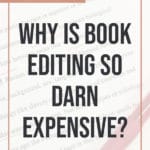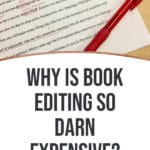Audio Playback Powered by Amazon Web Services |
It always surprises me how misunderstood the editing industry is by authors and writers in general. These are people I would presume would understand what goes into book editing, which means they should have a deeper understanding of why editing can feel expensive. Yet enough writers have asked me about the costs of editing, that I felt the need to address these costs publicly.
Just how much do editors charge?
Of course, every editor has a different formula for calculating how much they should charge. Some charge by the page, others by the word, and yet others by the hour. Regardless of how the editor has come up with their final tally, most of these charges still come fairly close to the same range.
The Editorial Freelancers Association helped define that range by sending out a survey to freelance writers and editors around the country and asking them about their fees. On average, editors make anywhere from $30 to $60 per hour depending on experience and the level of editing being sought.
Book editing is expensive because it's different from writing.
That hardly needs explaining, right?

Writing a book is tough. It requires discipline and creativity — two things that don't normally go hand in hand.
But once you've gotten that story out of your head and onto paper, the brain needs to do a flip. Creativity and flow go out the window. Now the brain needs to work more logically: seeking out mistakes, choosing the right words, and cutting unnecessary verbiage. It requires a systematic process completely ungoverned by creativity.
Editing takes more time than writing.
Going into a manuscript hunting for ways to improve it takes time. An editor doesn't just read through a manuscript. Rather, an editor does careful reading.
No skimming allowed.
All the while, they are looking for areas to help improve and strengthen your manuscript while highlighting your voice.
Additionally, most editors do two or three run throughs of any manuscript.
Editors do more than just fix your grammar.
If all an editor did was to fix your grammar, you could do that with the basic grammar and spelling checker built into your favorite word processor.
Sure, they aren't perfect, but after two or three run throughs you'll have caught roughly 97% of any mistakes you made. Maybe even 99%—certainly enough to pass the scrutiny of your average reader.
A real editor goes deeper, though. Not just in aiming to catch that last 1% of mistakes a basic automated spell-checker would catch, but in trying to learn and emulate your voice and find ways to make sure what is written is the best way to tell that story.
A real editor sets out to make the manuscript the best that it can be. They want your story to sound the best that you can tell it. They seek out plot holes, inconsistencies, and work to fix those while still maintaining your voice within the manuscript.
Running a business costs money.
I don't care what sort of business you have—it costs money to run and operate. Clients often forget this. Sometimes I wonder if a client pictures a freelance editor sitting in a dark dungeon-esque room working on the manuscript with telepathy.
There are costs involved in editing: Internet, electricity, and software updates to name a few of the basic ones. Web hosting, accounting, certifications, taxes, furniture, maintenance, phones, computers and printers….
The list goes on and on.
And in cases where the editor is working from home, these costs go up, not down.
And we haven't even gotten to basic living expenses yet: food, clothing, health insurance, rent or mortgage, heat, car payments. Editors don't go into business hoping to make just enough money to keep the business running.
They are also trying to make a living.
You really do get what you pay for.
Most editors understand that they are expensive. Most of us cringe right along with the authors when we send in our bids.
We know.
But editing really is one of those things in which you get exactly what you pay for. If you are going to try to save money in your quest to get published, honestly, cut costs anywhere but editing. And here's why….
You may luck out and get a well-seasoned, experienced editor for a huge discount. But if that well-seasoned, experienced editor has bills to pay (and I can guarantee you they do) then that editor is going to likely have to rush through your manuscript.
It's merely a game of numbers: if you charge less per manuscript, you have to complete more manuscripts to make the same amount of money. And working faster can lead to skimming, which can lead to careless mistakes that would otherwise be caught.
On the other hand, you may end up hiring an inexperienced editor, or someone for whom editing is not a full-time job. There are a growing number of high school and college students looking to earn some extra cash. And for some, editing is just the right ticket.
Hey, remember, that's how I got my start!
But, and this is a big but, that level of inexperience rarely results in a publish-worthy editing job.
That's not to say you won't find a good editor for dirt cheap.
They are out there.
Sometimes they are just under charging in an attempt to get their name out there before hiking their rates to be more competitive. In fact, less than a week ago I came across a young editor whose rates were less than 1/3 of the national average rates.
Less than 1/3!
While other editors are charging $30-$40 per hour, her rates were putting her at much closer to $8 or $9 per hour.
Now, maybe she can afford to live off $8 or $9 per hour. I don't know what her bills are or what her financial arrangements are. Maybe she still lives with her parents? Or with a rich boyfriend? Maybe she isn't depending on the money she's making from editing. Or maybe, as happens often, she plans on raising her rates as soon as she receives a few more certifications.
From what I could tell out of our conversation and from seeing some of her work, she's good. But finding an editor that good at those rates is rare — and certainly won't last long.
And about those discounted editors.
Don't expect a fast turnaround if you're paying next to nothing for your editor.
Even if you're talking to a good one, like the one I described above, who happens to be charging far less than industry standard, the chances of getting that manuscript returned high quality and quickly is astonishingly low.
Good editors still take time to run through your manuscript, even if they are taking on the job at a huge discount or as a pro bono case. And if you've found an editor working a discounted rate for you, chances are their higher paying clients will have to come first.
Book editing is no easy task. If it was, then everyone would do it and there wouldn't be a need for a separate industry. It's costly and time-consuming—perhaps the most expensive step in the entire publishing process—and it is worth every penny.
How can you save money on book editing?
The best way to save money on book editing is to run your book, novel, or manuscript through the ringer before you start looking for an editor.
Self-edit a minimum of four times:
- Once normal editing.
- Once while reading out loud.
- Once starting at the end and working backwards.
- Once normal again, but after a break so you have fresh eyes.
Book editing is expensive primarily because of the amount of time and work an editor has to do to make your book the best that it can be. But if you can make that job easier by catching a lot of the mistakes yourself, first, then it will save you money in the long run.
Did you enjoy this article? Here are some more posts on editing you may like:







I was a freelance editor for a time. I started out charging about $2 an hour and steadily raised my rates to $16 an hour over the course of a year and a half. As my rates went up and my portfolio grew, I saw more and more quality projects. I edited a lot of clickbait at the $5 level and below. By the time I hit $16, I was working with a well known author who left tips for me in the triple digits. Meanwhile, the $2, $3 and $5 so-called authors were more likely to skip out on a bill or try to negotiate a lower rate.
What I learned from freelancing is that the authors who wanted cheap services were the ones I didn’t want to work with anyway. I really enjoyed working with some of my later clients and I miss editing some days, until I remember the e-mails I got on a regular basis offering me “exposure” instead of payment. That and lack of time after my writing career took off is what eventually led me to have to give it up.
Ugh, the offer of “exposure.” Can it really even be called an offer? And you’re right, I have noticed that the authors looking to hire cheap editors tend to be low-quality clients. Real clients aren’t necessarily out to save a buck, they just want the most bang for their buck. They will pay you a fair wage if it is the best work they can get for that wage.
I’m a graduate of the Iowa Writers’ Workshop and the author of two novels and two books of short stories. I do freelance editing of fiction manuscripts for $60 per hour. I see that $60 is at the top of the suggested hourly rate, but I edit at a pace of 20-30 pages per hour, depending on the quality of the writing. Then I write a 5-6 page, single-spaced critique of the manuscript. That means that my fee for, say, an 80,000-word manuscript is about $800. A number of my writing clients have had novel manuscripts accepted by publishers. One writing client, for whom I have edited sixteen literary short stories over the last five years, has told me that, given the quality of my work, I should charge more. Maybe. I feel it’s a fair payment for the service I provide.
Hi Hugh! And that’s really what matters: is it a fair payment? Can you pay your bills and make a living charging what you charge? If those two questions are answered, then you don’t really have to worry about much else. I have also found that editors who calculate their charges by the hour (rather than by the word or by the page) tend to work faster, so I’m not surprised at all to see how fast you work. 🙂
Thanks, Naomi. Right — I’m surprised to see that some editors edit at a snail’s pace of 5 pages per hour, and get $45-$55 per hour.